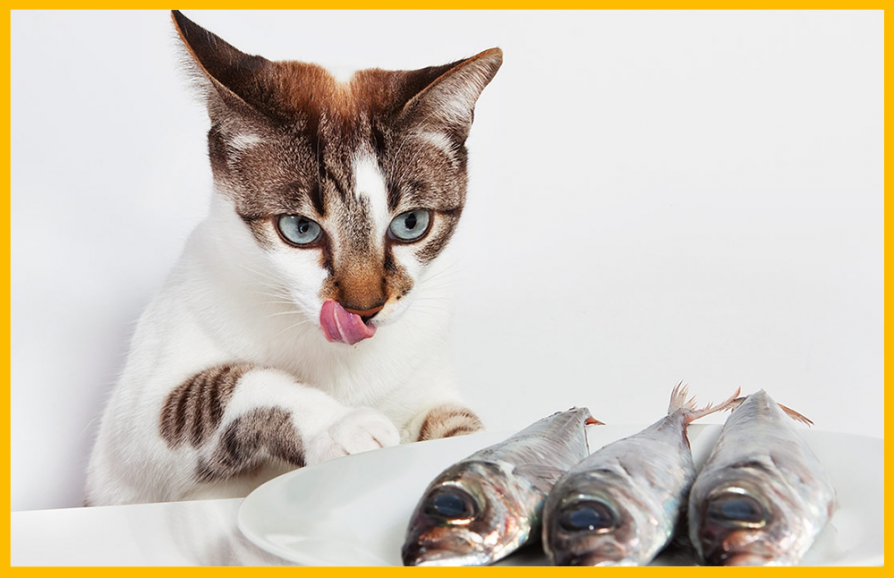Omega 3 for your cat: The ultimate guide
- November 4th 2019

In our last blog post, we covered omega 3 for dogs: its benefits, supplements and what you need to be aware of. Here is our blog for omega 3 for cats, so you know how this fatty acid impacts your beloved pet’s life.
What is omega 3?
Omega 3 is a
family of polyunsaturated fatty acids that have a wide range of health
benefits. These fatty acids have single and double bonds, and are great for
both animals and humans. The three main omega 3 fatty acids are eicosapentaenoic
acid, docosahexaenoic acid, and alphalenolic acid.
Omega 3 can be found in fish (especially cold water fish, like salmon), flaxseeds, chia seeds, walnuts and soybeans, among other sources. Cat food tends to be rich in omega 6, the other fatty acid, so it’s important to balance out your cat’s intake of omega 6 with a regular supply of omega 3. This can be ensured through omega 3 supplements or fish oil.

Source: ivcjournal.com
What are the benefits of omega 3 for cats?
There are a number of omega 3 benefits for cats. These include:
Benefits for osteoarthritis
Osteoarthritis is usually a sign of old age in cats. In this disease, your cat’s joints is affected, mostly their spine, elbows, hips and shoulders. This makes walking, jumping or running painful, and it’s not uncommon to see an elderly cat inch slowly throughout the house.
Omega 3 helps both prevent and reduce osteoarthritis. Research shows that, thanks to omega-3 fish oils, cats with osteoarthritis were able to walk up and down stairs, move less stiffly and even jump higher. They were also more active when interacting with owners.
Relief from inflammation
Cats are self-grooming, which means they spend a lot of time licking themselves or scratching and biting their skin. This can sometimes leave their skin raw. Omega 3 is known to help with the inflammation response in pets; this keeps their skin healthier, as it will reduce the chances of your cat scratching or biting themselves raw.
Benefits for cognitive abilities
Your cat’s mental health is as important as their physical health, and you should ensure they get the vitamins and minerals they need to keep their cognitive abilities sharp. Omega 3 in cats is known to improve cognitive ability and keep your cat more mentally active for longer.
Omega 3 for kittens
Omega 3 acids administered to pregnant or lactating cats can help with the development of their offspring. This is because kittens need docosahexaenoic acid for the development of their brains and the retinas of their eyes.
Why do cats need omega 3 supplements?
Cat food, even the healthiest and rawest version, is heavily weighted with omega 6. This means that your cat can fall short on their intake of omega 3, and it is important to always keep omega 6 and omega 3 in balance.
One way of achieving this balance is through supplements. Fish oil supplements is the best way of providing your cat with the omega 3 they may need. Other sources, such as flaxseed oil, contain omega-3 acids that must be absorbed and converted into eicosapentaenoic acid and docosahexaenoic acid for it to have meaningful health benefits. Such conversion gets more difficult as your cat grows older. Research shows that one third of cats above six years of age have diminished ability to ingest fats. Fish oil is a rich source of eicosapentaenoic acid and docosahexaenoic acid and requires less conversion ability, which makes it a great source of omega 3. Fish oil supplements are widely available.
What to look out for when supplementing omega 3
Omega 3 is a healthy fatty acid that’s necessary for your cat’s wellbeing. But too much omega 3 can be bad and you should always check with your vet regarding the recommended amount. If you’re giving your cat supplements, remember that supplementation should be restricted. While no one knows the exact amount of omega 3 that’s optimal for cats and dogs, the National Research Council in the US has established a safe upper limit for omega 3 and omega 6 for cats. This should be followed.
Also ensure you choose supplements that are not high in vitamin D. Products made from fish liver oils are high in vitamin D (although they’re also rich in eicosapentaenoic and docosahexaenoic acids), reaching levels that far exceed the daily amount recommended for cats and dogs. This can have negative side effects.
Too much omega 3 can also affect your cat’s inflammatory response, so check with your vet if you have any concerns.
In general, always supplement omega 3 in your cat’s diet after careful consultation with your vet. Don’t medicate on your own. Vets can tell you if you need to switch to another cat food brand or if you need supplements. If supplements are needed, they can recommend the best brands.
Comments
No posts found
